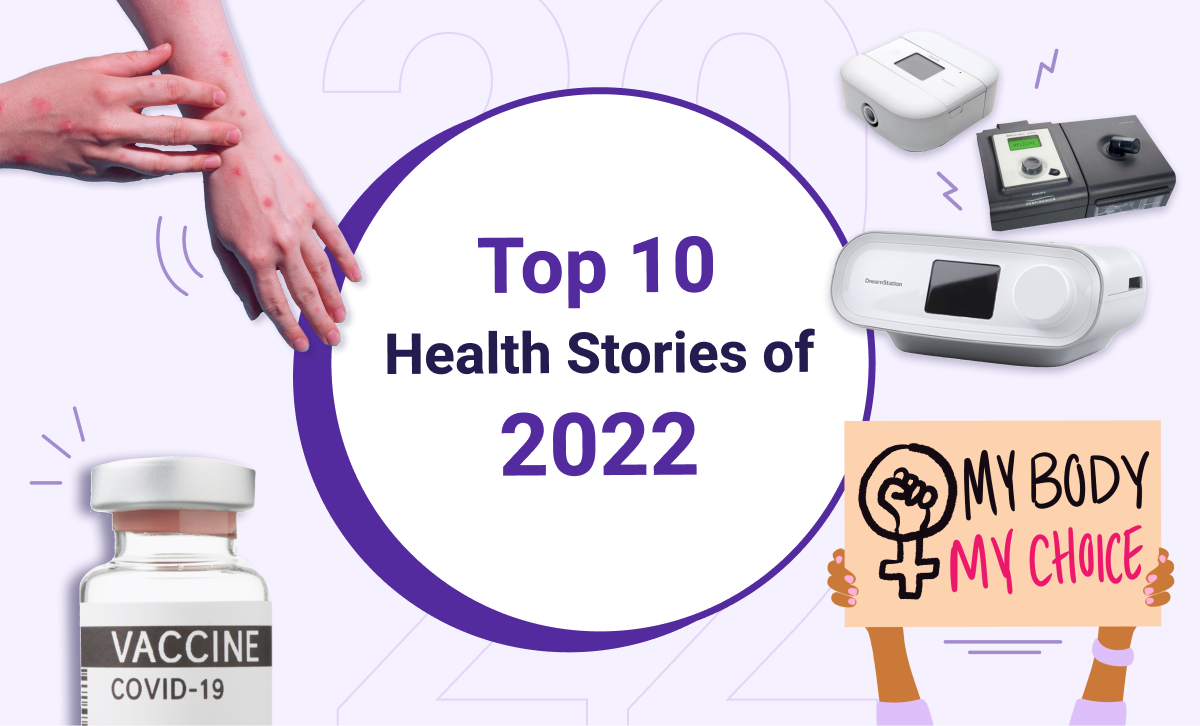
The Top 10 Health News Stories of 2022
The health stories that dominated the headlines this year.
Time flies and it’s not always easy to stay on top of the news with a busy schedule. But if you’ve fallen behind on your health news stories this year, don’t worry. The Illuminator has got your back.
These are the top 10 health news stories from the United States this year—the advancements, the trends, and the outbreaks that shook the world.
1 The United States experiences a monkeypox outbreak
In May 2022, an ongoing outbreak of monkeypox was confirmed in the United Kingdom. Infections soon spread throughout Europe, North America, South America, and Asia, which was the first time this infection spread widely outside of West and Central Africa.
This viral disease is spread through exposure to lesions, infected body fluids, or contaminated objects. Though all kinds of people were infected with monkeypox, the gay community was particularly impacted. In August, the CDC noted that 99% of reported cases were in men, 94% of whom reported being queer or having recent intimate contact with another man. The JYNNEOS vaccine was distributed to vulnerable communities. In November, the FDA authorized a novel monkeypox test.
2 A new COVID-19 variant spreads
Though Omicron first appeared in late November 2021, it spread throughout 2022, becoming the new most dominant version of COVID-19. Omicron subvariants are 30 times more infectious than previous versions of COVID due to mutations in the spike proteins. Be prepared to see new COVID variants into 2023 and beyond. (Worried about having COVID-19? Book a PCR test via LabFinder.)
3 The Supreme Court strikes down Roe v. Wade
In June, the Supreme Court determined that rights to abortions were not “deeply rooted in this Nation’s history of tradition.” The Court overturned Roe v. Wade, saying that individual states could decide whether to protect or prohibit abortions. This decision radically limited healthcare access for people across the country. According to Pew Research, the majority of Americans disapprove of the court’s decision and 62% say that abortion should be legal in all or most cases. In the November election, several ballot measures either limited or protected abortion access. Vermont, Michigan, and California voters established constitutional rights to personal reproductive autonomy, which would protect reproductive freedom and access to both abortion and contraception.
4 Adderall shortage rocks the mental health world
The FDA confirmed in October that there was a Book a PCR test via LabFinder, the stimulant drug used to treat attention deficit hyperactivity disorder. The reason for the shortage? One of the major drug producers experienced staffing shortages and hiring difficulties, which resulted in manufacturing delays. Some of those unable to get their medication experienced withdrawal and even ADHD rebound symptoms.
5 New AI advancements could have big impacts on pancreatic cancer and sepsis
Artificial intelligence has major potential in the health world, and it made waves in 2022. In September, a study in Radiology noted that a deep-learning tool could help them read imaging scans and identify pancreatic cancer. Another study from Johns Hopkins shows that a new AI system catches sepsis symptoms hours than traditional methods. Of the 1.7 million who develop sepsis every year, more than 250,000 die. Early detection with AI could save countless lives, as even an hour can make the difference between life or death in severe cases. The Johns Hopkins system uses data from the patient’s medical history, current symptoms, and lab results to indicate when someone is at risk. It also suggests treatment, such as antibiotics.
6 Continued developments in mRNA and immunology show promise
Traditional vaccines use dead or weak virus material to stimulate immune responses. However, these vaccines can take a long time and a lot of money to develop, and they aren’t easy to quickly modify to accommodate mutations. mRNA vaccines who promise because they “use a genetic code to tell the body’s cells to produce proteins that train the immune system,” according to Penn Medicine. “The result: ‘plug-and-play’ vaccines with rapid development times and lower costs.” These vaccines have seen accelerated widespread adoption, as they were the type of vaccine used for COVID-19. However, even before COVID-19, an mRNA vaccine for the flu was already in clinical trials. Now researchers are working on mRNA vaccines and mRNA therapies for HIB, hepatitis C, HIV, malaria, tuberculosis, genital herpes, cancer, allergies, genetic diseases, and more.
7 Teens look to TikTok for mental health self-diagnosis
Mental health help isn’t always accessible, plus it can be expensive. Many people, especially teens and young adults, have looked to social media for answers. TikTok, known for its short, engaging videos, has seen a boom of information (and misinformation) about mental health. The results of this are mixed. On one hand, this proliferation has reduced stigma around mental illness. On the other hand, mental health experts and providers say they’re seeing more people self-diagnosing after seeing something online. As the New York Times reported, “In some cases, this information can lead them toward getting the help they need, but it can also result in people incorrectly labeling themselves, avoiding a professional assessment and embracing ineffective or inappropriate treatments.”
8 CPAP recalls and supply-chain issues impact sleep apnea patients
When Philips first recalled millions of CPAP machines, devices which force air through a mask to keep breathing passageways open during sleep, they said they would repair or replace units within a year. That was in 2021. Sleep apnea patients waited and waited well into 2022. Now, Philips says they won’t be able to help some patients until 2023. Sleep apnea can cause patients to stop breathing throughout the night, disturbing sleep and leading to an increased risk of heart attack. Many patients who just want to simply buy new machines have been out of luck — not only do CPAPs cost between $500 and $1,000, but supply chain issues have limited their availability. Things have become so dire that the FDA has intervened, asking Philips to give more updates and accelerate their process.
9 A spike in STDs/STIs…thanks to COVID
Public health experts say that the COVID-19 pandemic contributed to a startling rise in sexually transmitted infections. Why? COVID-19 deterred people from going to their providers and getting routine health care, which includes STI screenings. Now, congenital syphilis has risen by 184%, with the spike traced directly to the COVID-19 pandemic. Gonorrhea and chlamydia also spread more widely. (Tip: Don’t delay care. Book an STD test through LabFinder and read more about STD tests here.)
10 A heartbreaking milestone: One million COVID-19 deaths this year
Though it may be tempting to say that we’re past the COVID-19 pandemic, more than 1 million people died of COVID worldwide this year. The World Health Organization said that vaccination access needs to be pushed throughout the world. If you’re wondering whether you might have COVID-19, get tested via LabFinder.
What topics do you think we should cover? Drop us a line at illuminator@labfinder.com.





LabFinder Editorial Team
The LabFinder Editorial Team is behind The Illuminator and The Insider, LabFinder’s consumer and business blogs.
Dr.Robert Segal
Dr. Segal is CEO and co-founder of LabFinder, as well as a board-certified cardiologist. He began practicing medicine in 2002 and has founded several businesses, including Medical Offices of Manhattan and Manhattan Cardiology.